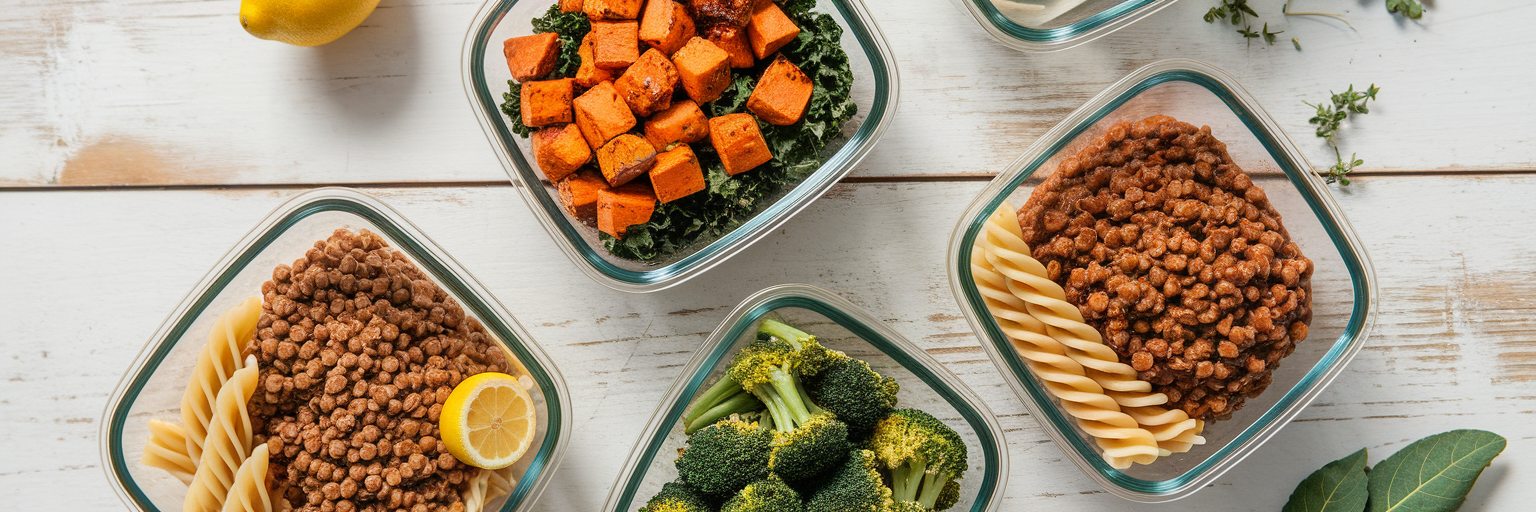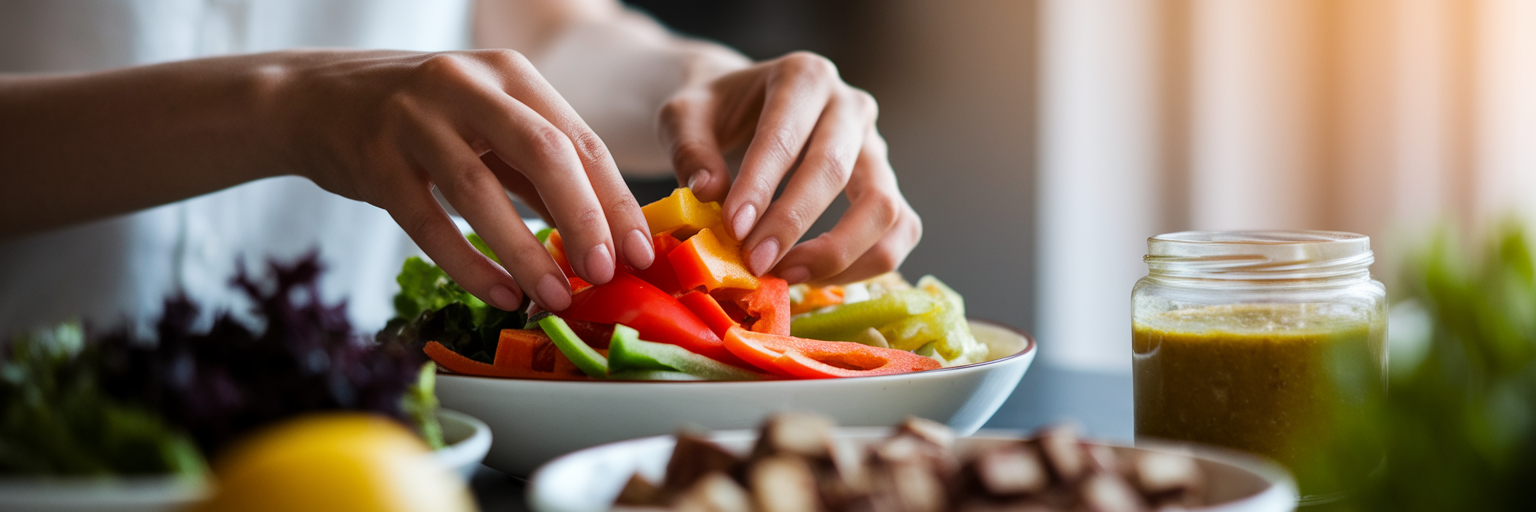Why Vegan Athletes Prioritize Protein for Recovery
Let's clear the air on an old myth: the idea that building muscle on a vegan diet is an uphill battle. The truth is, a well-planned, plant-based diet provides every tool you need for excellent muscle repair and growth. It’s all about understanding the process. When you work out, you create tiny micro-tears in your muscle fibers. Protein provides the essential amino acids, the building blocks that your body uses to repair those tears, making your muscles stronger than before.
Many people wonder about getting "complete" proteins, which contain all nine essential amino acids. It’s simpler than you think. Foods like tofu, tempeh, quinoa, and edamame are fantastic complete protein sources. By combining different plant foods, like rice and beans, you can easily get the full spectrum of amino acids your body needs.
This article is designed to show you exactly how to create delicious and effective vegan muscle recovery meals. We’re sharing five specific, high-protein vegan meal prep ideas to help you fuel your fitness goals and feel your best.
Balancing Your Macros for Optimal Plant-Based Recovery
Effective recovery isn't just about protein. It’s about the synergy between all three macronutrients. Understanding how to balance vegan macros is what truly supports your body's repair process. Think of your plate as a team where protein, carbohydrates, and fats all have an important job to do.
Carbohydrates are your body's primary energy source. After a tough workout, your muscle glycogen—the stored form of glucose—is depleted. Replenishing it is critical for energy and recovery. Complex carbs like sweet potatoes, oats, and whole grains provide a steady release of energy. In fact, the Physicians Committee for Responsible Medicine (PCRM) suggests that active individuals should aim for carbohydrates to make up 50-60% of their total intake.
Protein is the star of muscle repair. It triggers a process called muscle protein synthesis (MPS), where your body rebuilds damaged muscle fibers. And you don't have to worry about its effectiveness. A recent NPR report on a study found no significant difference in muscle gain between vegan and omnivorous diets when protein intake was matched. For those looking to conveniently boost their intake, you can explore some of the best protein powders available.
Finally, healthy fats from sources like avocados, nuts, and seeds play a crucial role in reducing inflammation and supporting hormone production, both of which are vital for recovery. A balanced plate is the secret to feeling strong and ready for your next session.
| Macronutrient | Primary Role in Recovery | Excellent Vegan Sources |
|---|---|---|
| Protein | Repairs muscle tissue and stimulates growth (MPS) | Tofu, tempeh, lentils, seitan, edamame |
| Carbohydrates | Replenishes muscle glycogen (energy stores) | Oats, quinoa, sweet potatoes, brown rice, fruit |
| Healthy Fats | Reduces inflammation and supports hormone production | Avocado, walnuts, chia seeds, flax seeds, olive oil |
This table provides a quick reference for understanding how each macronutrient contributes to your recovery and offers examples of nutrient-dense, plant-based foods to include in your meals.
5 High-Protein Vegan Recipes for Your Weekly Prep

Consistency is everything in fitness, and having delicious meals ready to go makes all the difference. This is where high protein vegan meal prep becomes your best friend. Here are five simple and satisfying recipes to get you through the week.
Recipe 1: Tofu Scramble & Black Bean Breakfast Burritos
These burritos are the perfect grab-and-go breakfast, packed with complete protein to start your day strong.
- Key Ingredients: 1 block firm tofu, 1 can black beans (rinsed), 1 bell pepper (diced), 1 small onion (diced), nutritional yeast, turmeric, cumin, whole wheat tortillas.
- Crumble tofu into a non-stick pan and cook until moisture evaporates.
- Add diced veggies and cook until softened.
- Stir in black beans, nutritional yeast, turmeric, and cumin. Cook for 2-3 minutes.
- Spoon the mixture into tortillas, roll them up, and wrap individually for the week.
Recipe 2: Hearty Lentil and Walnut Bolognese
This bolognese delivers a rich, "meaty" texture that’s incredibly satisfying. For an extra protein kick, serve it over chickpea pasta.
- Key Ingredients: 1 cup brown or green lentils, 1/2 cup chopped walnuts, 1 jar marinara sauce, 1 onion (diced), 2 carrots (diced), 2 celery stalks (diced), garlic, olive oil.
- Sauté onion, carrots, and celery in olive oil until soft. Add garlic and cook for another minute.
- Add lentils, walnuts, and marinara sauce, plus 1 cup of water or vegetable broth.
- Bring to a simmer and cook for 30-40 minutes, until lentils are tender.
- Serve over your favorite pasta and store leftovers in airtight containers.
Recipe 3: The Ultimate Chickpea & Quinoa Power Bowl
This bowl is a nutrient-dense powerhouse that’s completely customizable. The lemon-tahini dressing ties it all together.
- Key Ingredients: 1 cup quinoa (cooked), 1 can chickpeas (rinsed), chopped cucumber, cherry tomatoes, spinach, tahini, lemon juice, maple syrup.
- To make the dressing, whisk together 3 tbsp tahini, 2 tbsp lemon juice, 1 tbsp maple syrup, and a splash of water until smooth.
- Assemble your bowls by layering a base of quinoa and spinach.
- Top with chickpeas, cucumber, and tomatoes.
- Drizzle with the lemon-tahini dressing just before serving. Prep ingredients separately for freshness.
Recipe 4: Quick Seitan & Broccoli Stir-Fry
When you need a protein-packed dinner in under 20 minutes, this stir-fry is the answer. Seitan is a fantastic high-protein option.
- Key Ingredients: 1 package seitan (cubed), 1 head of broccoli (chopped), soy sauce, sesame oil, ginger, garlic, brown rice for serving.
- In a wok or large pan, stir-fry seitan in a little sesame oil until browned. Remove from pan.
- Add broccoli to the pan with a splash of water and steam for 3-4 minutes.
- Return seitan to the pan. Add minced ginger, garlic, and a generous splash of soy sauce.
- Toss everything together and serve immediately over brown rice.
Recipe 5: Chocolate Peanut Butter Protein Oats
This is one of those easy vegan protein recipes that feels like a treat. It’s a perfect no-cook, post-workout meal that’s ready when you are.
- Key Ingredients: 1/2 cup rolled oats, 1 tbsp chia seeds, 1 tbsp peanut butter, 1 scoop of our Chocolate Vegan Protein powder, 1 cup plant-based milk.
- In a jar or container, combine all ingredients.
- Stir or shake well until the protein powder is fully dissolved.
- Seal and refrigerate for at least 4 hours, or overnight.
- Enjoy cold, straight from the jar. You can make several of these at once for the week.
If you loved these ideas and are looking for more inspiration, be sure to check out our other easy vegan protein recipes you'll actually crave.
Smart Meal Prep Strategies to Save You Time
The secret to successful meal prep isn't just having good recipes; it's having a smart system. These simple strategies will help you stay efficient in the kitchen so you can spend more time doing what you love.
- Batch Cook Your Staples: Dedicate an hour on Sunday to cook large quantities of your base ingredients. Make a big pot of quinoa, brown rice, or lentils. Bake a block of tofu or tempeh. Having these ready makes assembling meals during the week incredibly fast.
- Prep Ingredients, Not Just Meals: Sometimes, you don't need to cook full meals in advance. Simply washing and chopping all your vegetables, making a big jar of salad dressing, or portioning out nuts and seeds into snack bags can save you precious minutes each day.
- Store for Freshness: Use airtight glass containers to keep your food fresh. As a general guide, grain bowls and stir-fries last well for up to 4 days in the fridge, while heartier meals like the lentil bolognese can last up to 5 days.
What are your favorite meal prep hacks? Share them in the comments below! For more helpful articles on nutrition and plant-based living, be sure to explore our blog.
Building a Sustainable Fitness Routine

The best fitness plan is one you can stick with, and the same goes for your nutrition. One of the biggest hurdles people face is "meal fatigue"—getting bored of eating the same thing every day. The key to long-term success is building variety into your routine.
You don’t need to reinvent the wheel every week. Small changes make a big impact. Try these simple strategies:
- Rotate Your Proteins: If you had tofu and lentils this week, switch to tempeh and chickpeas next week. This simple swap provides different micronutrients and keeps things interesting.
- Switch Up Sauces and Spices: A basic grain bowl can be completely transformed by the sauce. Try a peanut-lime sauce one week and a lemon-herb vinaigrette the next. Different spice blends can also give your favorite dishes a new identity.
- Embrace Seasonality: Visiting a local U.S. farmers' market is a great way to discover new vegetables. Incorporating seasonal produce into your plant based meal prep ideas not only adds incredible flavor but also ensures you’re getting a wider range of nutrients.
Remember, a balanced vegan diet is a powerful tool for athletic performance. Meal prep provides the consistency you need, and variety makes it an enjoyable, sustainable lifestyle. Ready to fuel your journey? Explore our full collection of plant-based supplements and foods designed for athletes like you.



